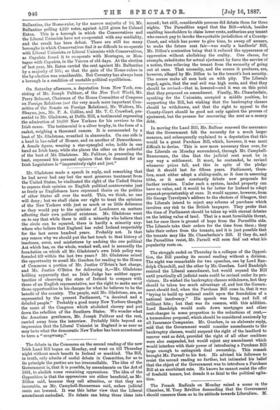• The debate in the Commons on the second reading
of the new "Irish Land Bill began on Monday, and went on till Thursday night without much benefit to Ireland or mankind. The Bill, in truth, only admits of useful debate in Committee, for as to its principle the parties are too irreconcilable. The idea of the Government is, that it is possible, by amendments on the Act of 1881, to abolish some remaining oppressions. The idea of the Opposition is that the oppressions are either beneficial, as Mr. Dillon said, because they call attention, or that they are incurable, as Mr. Campbell-Bannerman said, unless judicial rents are lowered. It was this latter view that the Liberal amendment embodied. No debate can bring those ideas into
accord; but still, considerable persons did debate them for three nights. The Parnellites urged that the Bill—which, besides enabling leaseholders to claim lower rents, authorises any tenant who cannot pay to invoke the equitable jurisdiction of a County. Court, and which has power to give time, to sweep off arrears, to make the future rent fair—was really a landlords' Bill, Mr. Dillon's contention being that it reduced the appearance of oppression without abolishing the reality. One clause, for example, substitutes for actual ejectment by force the service of a notice, thus relieving the tenant from the necessity of going out at once. That necessity, and the scenes it produces, are, however, alleged by Mr. Dillon to be the tenant's best security. The scenes make all men look on with pity. The Liberals urged, again, that the real evil MIS high rents, and that they should be revised—that is, lowered—and it was on this point that they proposed an amendment. Finally, Mr. Chamberlain, speaking for the Unionists, occupied a middle position, he supporting the Bill, but wishing that the bankruptcy clauses should be withdrawn, and that the right to appeal to the County-Court should be good not only against the process of ejectment, but the process for recovering the rent as a money debt.
































 Previous page
Previous page